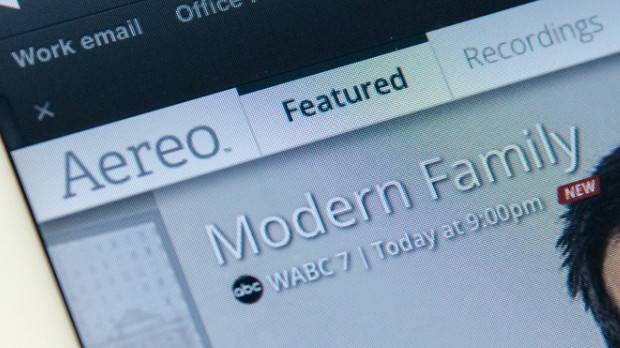 Big win for broadcasters against Aereo NEW YORK (CNNMoney) A huge win for the nation's biggest television broadcasters: in a 6-3 ruling, the Supreme Court said Wednesday that streaming television startup Aereo violates the Copyright Act.
Big win for broadcasters against Aereo NEW YORK (CNNMoney) A huge win for the nation's biggest television broadcasters: in a 6-3 ruling, the Supreme Court said Wednesday that streaming television startup Aereo violates the Copyright Act. "Today's decision is a victory for consumers," Paul Clement, the attorney representing the broadcasters, said in a statement. "The Court has sent a clear message that it will uphold the letter and spirit of the law just as Congress intended."
The ruling essentially protects billions of dollars in retransmission fees that broadcasters collect for their signals. Media stocks rallied after the ruling.
Ever since Aereo was introduced in early 2012, its biggest financial backer, Barry Diller, has said that there is "no plan B" if the courts concluded that it was operating illegally.
He did not immediately respond to requests for comment from CNN, but he told CNBC that he thought the ruling was a "big loss for consumers who seek alternatives to the cable bundle. "We did try, but now it's over," he told CNBC.
Using thousands of miniature TV antennas, Aereo scoops up the freely available signals of local stations in cities like New York, Boston and Atlanta. It then delivers those signals to the smartphones, tablets or computers of paying subscribers.
Subscribers pick what to watch through a traditional on-screen guide. They can also record shows and stream them later.
A group of broadcasters sued Aereo in early 2012, before it had even launched in its first market, New York City. The broadcasters asserted that Aereo violated copyright laws by allowing "public performances" of their TV shows. Aereo said it was only enabling private screenings, just like off-the-shelf TV antennas do.
The issue reached the Supreme Court last fall and the case was heard in April.
The formal issue before the court was "whether a company 'publicly performs' a copyrighted television program when it retransmits a broadcast of that program to thousands of paid subscribers over the Internet."
"W believe that resolution of questions about cloud computing, remote storage DVRs and other novel matters not now before us should await a case in which they are clearly presented," Justice Stephen Breyer said.
So while this ruling on copyrights could make it harder for other companies relying on the growing cloud computing technology to promote their entertainment and information options, it! doesn't prevent new technological and financial avenues from being explored.
Aereo is only the latest in a series of legal challenges -- and public debate -- in this digital age.
The owners of ABC, CBS (CBS), Fox (FOXA), NBC, Univision and other broadcasters put up a united front against Aereo. (Time Warner (TWX), the parent company of CNN and CNNMoney, was not a plaintiff in the case, but did support the broadcasters.)
Fueling the feeling that Aereo was David battling Goliath, the Justice Department and the United States Copyright Office took a public position against Aereo and called it "clearly infringing."
"What Aereo is doing is really the functional equivalent of what Congress in the 1976 [Copyright] Act wanted to define as a public performance," Malcolm Stewart, a deputy solicitor general at the Department of Justice, told the Supreme Court justices during oral arguments in April.
Aereo and its supporters strongly disagreed -- they said the service was expressly created to abide by the law.
"Aereo is, essentially, simply an antenna device that replaces technologically what you used to have to do — to go up to your rooftop and erect an antenna," Diller said.
But on Wednesday the Supreme Court agreed with the broadcasters that Aereo qualifies as a "public performance."
Aereo had no immediate comment about Wednesday's ruling.
Diller, in a CNN interview in April, said that a ruling against Aereo would "have profound effects on the development of technology."
But one of the plaintiffs, The Walt Disney Company, weighed in right away: "We're gratified the Court upheld important Copyright principles that help ensure that the high-quality creative content consumers expect and demand is protected and incentivized."
--CNN's Bill Mears contributed reporting from Washington, D.C.
No comments:
Post a Comment